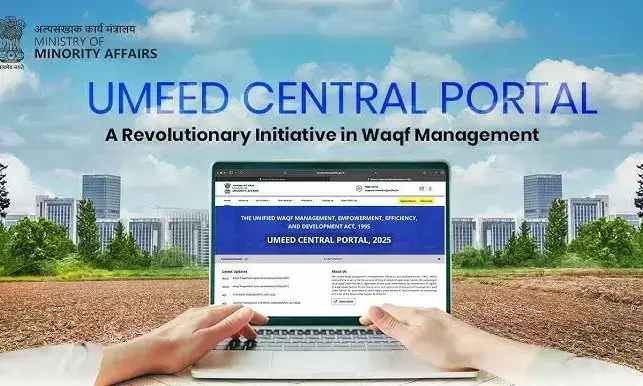SC refuses to consider plea against mandatory waqf registration on Centre's Umeed Portal

The Supreme Court today refused to hear an application filed against the 'Umeed Portal' launched by the Union government for the online registration of waqfs.
"You register it, nobody is refusing you from registration ....we will be considering that part," Chief Justice of India BR Gavai said while indicating that the issue will be considered by court in the case pending against the Waqf Amendment Act.
Court was told that while an application was filed for directions, the Registry did not allow it. saying that judgment in the matter was already reserved.
Notably, the All India Muslim Personal Law Board (AIMPLB) has also approached the Supreme Court seeking suspension of the government’s newly launched ‘Umeed Portal’, arguing that it directly undermines ongoing challenges to the Waqf (Amendment) Act, 2025. In its writ petition, the Board urged the court to either ban the portal or direct the Union government to withdraw the notification mandating its use until the Supreme Court rules on the Act’s constitutional validity.
AIMPLB national spokesperson Dr. S.Q.R. Ilyas stated that despite repeated appeals, the government launched the portal on June 6, making online registration of Waqf properties compulsory. The petition contends that the portal exerts “illegal pressure” on mutawallis (Waqf property managers) and could prejudice the reliefs being sought in the pending cases before the apex court. “The Act itself is under review by the Supreme Court. Launching the portal at this stage is both illegal and an act of contempt,” Dr. Ilyas said.
The Board further highlighted that several communities, including Muslims, political parties, human rights groups, and even Sikh and Christian organisations, have opposed the 2025 law. AIMPLB argues that until judicial scrutiny concludes, operationalising the portal is unconstitutional and premature.
Earlier, AIMPLB had issued a press note stating that it will soon approach the Supreme Court against the government's move to launch the “Waqf Umeed Portal” from June 6. "...it is unfortunate that despite this, the government is launching the “Waqf Umeed Portal” from June 6 and is making the registration of waqf properties mandatory through it. This action is entirely illegal and clearly constitutes contempt of court", the AIMPLB stated in a press note issued by it.
The Supreme Court on May 22nd had reserved its order on interim relief in a batch of petitions challenging the constitutional validity of the Waqf (Amendment) Act, 2025, which, among other provisions, abolishes the concept of "waqf by user" and introduces sweeping changes to the registration and classification of waqf properties across India.
CJI BR Gavai led bench had heard arguments from Senior Advocates Kapil Sibal, Rajeev Dhavan, and Abhishek Manu Singhvi on behalf of the petitioners. Solicitor General Tushar Mehta appeared for the Union of India.
Union led by Solicitor General Tushar Mehta has defended the legislation on behalf of the Union government. Countering petitioners’ claims that the law enables a “wholesale takeover” of waqf properties, Mehta said the amendment was introduced after the Joint Parliamentary Committee received 97 lakh representations and consulted 25 Waqf Boards. He stressed that none of the petitions were filed by “affected individuals” and argued that the law targets a “menace” dating back to 1923.
On the petitioners’ contention that the Act abolishes ‘waqf by user’, properties deemed waqf through long usage, Mehta had said such recognition was never a fundamental right but a statutory concession, subject to change. He pointed to opportunities under the 1923, 1954 and 1995 Acts for registration and cited reports describing widespread evasion in registering waqfs. “Any unregistered claim today is fictitious,” he said, adding that creating a waqf is not an essential religious practice.
Addressing objections to government officers deciding disputes, Mehta maintained that remedial avenues remain open through Waqf Tribunals and appellate courts. He further argued that Waqf Boards perform only “secular functions” like audits and litigation, justifying the inclusion of non-Muslim members. Conservation of monuments, protection of tribal land, and preventing unilateral claims by waqf boards, he added, were key objectives of the amendment.
Central Government had also submitted a detailed preliminary affidavit before the Supreme Court, defending the constitutional validity of the Waqf (Amendment) Act, 2025, and opposing interim reliefs sought by petitioners challenging the law. Centre argued that the Waqf Amendment Act, 2025, was passed after extensive consultations, including the formation of a 31-member Joint Parliamentary Committee (JPC) comprising representatives from multiple political parties.
The affidavit emphasizes that many of the petitioners had themselves participated in the JPC deliberations. “Grant of an injunction against the operation of any provision of the law, either directly or indirectly, would be violative of the presumption of constitutionality, which is a critical component of the balance of power between the legislature and the judiciary,” the Centre had further submitted.
After receiving presidential assent, the 2025 Waqf Amendment Act came under unprecedented legal challenge, with over 65 petitions filed before the Supreme Court. The petitioners included political leaders, civil society groups, and clerics. Among them were AIMIM chief and Member of Parliament Asaduddin Owaisi, AAP legislator Amanatullah Khan, Arshad Madani of the Jamiat Ulama-e-Hind, Congress leaders Imran Masood and Udit Raj, RJD’s Manoj Kumar Jha, TMC’s Mahua Moitra, CPI(M) leader Mohammad Salim, the Indian Union Muslim League, the Communist Party of India, Shia cleric Syed Kalbe Jawad Naqvi, and Anjuman-E-Islam, besides rights organisations like the Association for the Protection of Civil Rights.
In contrast, six states, Haryana, Maharashtra, Madhya Pradesh, Rajasthan, Chhattisgarh, and Assam, moved the court in support of the law, vouching for its constitutionality.
